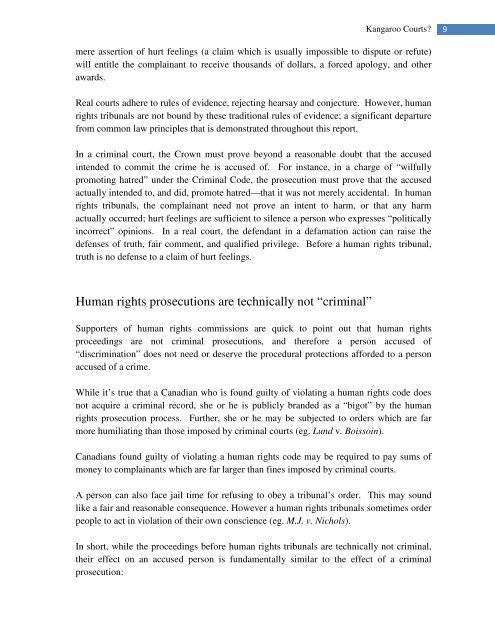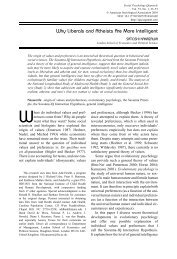Kangaroo-Courts
Kangaroo-Courts
Kangaroo-Courts
Create successful ePaper yourself
Turn your PDF publications into a flip-book with our unique Google optimized e-Paper software.
<strong>Kangaroo</strong> <strong>Courts</strong>?<br />
9<br />
mere assertion of hurt feelings (a claim which is usually impossible to dispute or refute)<br />
will entitle the complainant to receive thousands of dollars, a forced apology, and other<br />
awards.<br />
Real courts adhere to rules of evidence, rejecting hearsay and conjecture. However, human<br />
rights tribunals are not bound by these traditional rules of evidence; a significant departure<br />
from common law principles that is demonstrated throughout this report.<br />
In a criminal court, the Crown must prove beyond a reasonable doubt that the accused<br />
intended to commit the crime he is accused of. For instance, in a charge of “wilfully<br />
promoting hatred” under the Criminal Code, the prosecution must prove that the accused<br />
actually intended to, and did, promote hatred—that it was not merely accidental. In human<br />
rights tribunals, the complainant need not prove an intent to harm, or that any harm<br />
actually occurred; hurt feelings are sufficient to silence a person who expresses “politically<br />
incorrect” opinions. In a real court, the defendant in a defamation action can raise the<br />
defenses of truth, fair comment, and qualified privilege. Before a human rights tribunal,<br />
truth is no defense to a claim of hurt feelings.<br />
Human rights prosecutions are technically not “criminal”<br />
Supporters of human rights commissions are quick to point out that human rights<br />
proceedings are not criminal prosecutions, and therefore a person accused of<br />
“discrimination” does not need or deserve the procedural protections afforded to a person<br />
accused of a crime.<br />
While it’s true that a Canadian who is found guilty of violating a human rights code does<br />
not acquire a criminal record, she or he is publicly branded as a “bigot” by the human<br />
rights prosecution process. Further, she or he may be subjected to orders which are far<br />
more humiliating than those imposed by criminal courts (eg. Lund v. Boissoin).<br />
Canadians found guilty of violating a human rights code may be required to pay sums of<br />
money to complainants which are far larger than fines imposed by criminal courts.<br />
A person can also face jail time for refusing to obey a tribunal’s order. This may sound<br />
like a fair and reasonable consequence. However a human rights tribunals sometimes order<br />
people to act in violation of their own conscience (eg. M.J. v. Nichols).<br />
In short, while the proceedings before human rights tribunals are technically not criminal,<br />
their effect on an accused person is fundamentally similar to the effect of a criminal<br />
prosecution:






